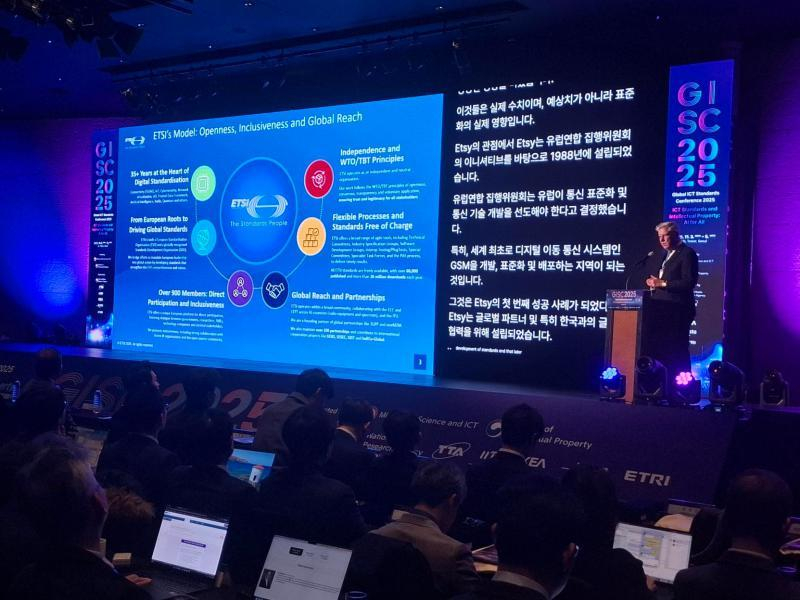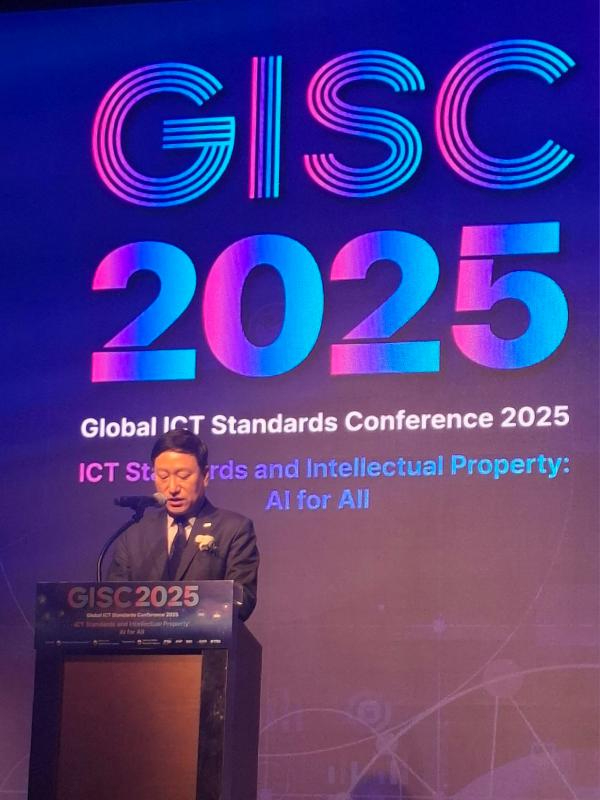Sophia Antipolis, France, 3 November 2025
ETSI’s Director-General, Mr. Jan Ellsberger, and Chief Policy Officer, Mr. Martin Chatel are in the Republic of Korea this week to engage with government representatives, trade associations, and standardisation partners.
ETSI is honoured to participate in the Global ICT Standards Conference 2025, hosted by its longstanding partner TTA, the Telecommunication Technology Association of South Korea. This follows the renewal of their cooperation agreement in March 2025.
 In his keynote speech, “Global ICT Standards for a Sustainable and Trustworthy Digital Future” Mr. Ellsberger reaffirmed ETSI’s commitment to global collaboration and highlighted Europe’s role in shaping an open, inclusive, and consensus-driven standards ecosystem. With over 950 members and 35 years of experience, ETSI continues to bridge European excellence and international standardisation efforts in areas such as 6G, AI, cybersecurity, quantum technologies, and trusted data frameworks. He emphasised that diversity across technologies, contributors, and regions drives innovation, resilience, and security in 6G and AI, while open standards from ETSI and 3GPP promote fair competition, rapid adoption, and “AI for All.”
In his keynote speech, “Global ICT Standards for a Sustainable and Trustworthy Digital Future” Mr. Ellsberger reaffirmed ETSI’s commitment to global collaboration and highlighted Europe’s role in shaping an open, inclusive, and consensus-driven standards ecosystem. With over 950 members and 35 years of experience, ETSI continues to bridge European excellence and international standardisation efforts in areas such as 6G, AI, cybersecurity, quantum technologies, and trusted data frameworks. He emphasised that diversity across technologies, contributors, and regions drives innovation, resilience, and security in 6G and AI, while open standards from ETSI and 3GPP promote fair competition, rapid adoption, and “AI for All.”
Mr. Scott Cadzow, Chair of ETSI’s Technical Committee Securing Artificial Intelligence (TC SAI), spoke at the Global Standards Strategy Seminar I (AI), presenting ETSI’s perspective on Physical AI and Standardisation to secure and assure the safe use of AI. He outlined six years of progress and future priorities.
ETSI’s Key Contributions to AI Standardisation:
- Since 2019, ETSI has supported the safe and secure use of AI through robust standards. The creation of ISG SAI addressed the lack of common understanding around AI threats with AI as a system in its own right; a component of a system; an adversarial attacker; and, as a system defender. It laid the groundwork for a rational, evidence-based narrative accessible to both technical experts and broader audiences.
- ETSI’s methodology follows a clear path: problem identification, solution research, and solution specification. This approach ensures that mitigation strategies evolve alongside AI technologies—from Machine Learning to Generative, Agentic, and General AI.
- Through ETSI’s methodology, its members are guided by ETSI’s Directives, codes of conduct and other frameworks that ensure consensus is built without dispute. Ethical considerations are embedded in ETSI’s standards work, though not explicitly defined. Standards must be necessary, unambiguous, complete, precise, well-structured, consistent, and testable - criteria that make defining “ethical AI” in a standardisation context particularly challenging.
Milestones in ETSI’s AI activity:
- 2019–2023: ISG SAI published no less than 9 reports, including the AI Threat Ontology, Mitigation Strategy, and Data Supply Chain Security.
- 2024–2025: TC SAI, created in 2023, accelerated output with 17 publications in its first two years, covering topics such as AI model traceability, privacy, explicability, and cybersecurity.
Establishing a Baseline for AI Security:
ETSI’s latest milestone is the publication of a baseline for AI Security titled “Baseline Cyber Security Requirements for AI Models and Systems”, addressing core principles across five lifecycle phases: Design, Development, Deployment, Maintenance, and End-of-Life. These principles ensure that AI systems are safe and secure from inception through decommissioning, offering confidence in their long-term viability and resilience.
 We would like to thank TTA and its President Mr. Seung-Hyun Son and Vice-President Mr. Daejung Kim, for the excellent organisation of this event and our invitation.
We would like to thank TTA and its President Mr. Seung-Hyun Son and Vice-President Mr. Daejung Kim, for the excellent organisation of this event and our invitation.
